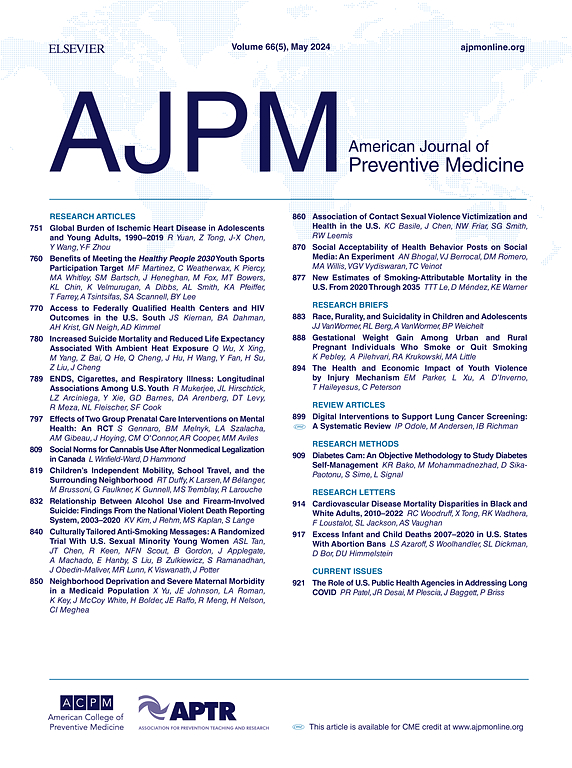Blood-Based Colorectal Cancer Screening: Implementation Into 2 Appalachian Primary Care Clinics
IF 4.3
2区 医学
Q1 MEDICINE, GENERAL & INTERNAL
引用次数: 0
Abstract
Introduction
Colorectal cancer is a serious health concern in the U.S. and worldwide and the third leading cause of cancer mortality. Appalachia ranks low in screening for colorectal cancer and correspondingly higher in incident and mortality rates than other regions of the U.S. This study aimed to determine whether offering a blood-based test to screen for colorectal cancer would result in increased rates of screening for colorectal cancer.
Methods
Colorectal cancer screening rates were measured in 2 primary care clinics over two 3-month phases. In Phase 1, physicians conducted colorectal cancer screening with standard-of-care options only (n=74). Phase 2 differed by offering blood-based test along with standard-of-care options (n=165). The study objective was to see whether offering a blood-based test would (1) increase the overall rate of screening and (2) prove to be a preferred method of screening compared with standard-of-care options. Data were gathered and evaluated in 2024.
Results
There was a large observed increase in overall completed screening rates when comparing Phase 1 (n=33) with Phase 2 (n=151). In addition, in Phase 2, the blood-based test option was a strong preference to standard of care (standard of care, n=29; blood-based test, n=134) with this sample group.
Conclusions
The availability of a blood-based test as one option for routine colorectal cancer screening in adults with average risk for colorectal cancer had a clear positive impact on overall screening rates, completion rates, and patient preference to standard-of-care options.
基于血液的结直肠癌筛查:副标题:在两个阿巴拉契亚初级保健诊所的实施。
导读:结直肠癌(CRC)是美国和世界范围内严重的健康问题,也是癌症死亡的第三大原因。阿巴拉契亚在CRC筛查方面排名较低,与美国其他地区相比,发病率和死亡率相应较高。本研究旨在确定提供基于血液的检查(BBT)来筛查CRC是否会导致CRC筛查率的增加。方法:在两个初级保健诊所测量CRC筛查率,为期两个月。在第一阶段,医生仅使用标准护理(SOC)选项进行结直肠癌筛查(N = 74)。第二阶段的不同之处在于提供BBT和SOC选项(N = 165)。该研究的目的是观察提供BBT是否会1)提高总体筛查率,2)证明与SOC选项相比,BBT是一种首选的筛查方法。数据收集和评估于2024年进行。结果:与第1期(N = 33)相比,第2期(N = 151)的总体完成筛查率显著增加。此外,在第二阶段,BBT选项比SOC更受青睐(SOC, N = 29;BBT, N = 134)。结论:在平均CRC风险的成人中,BBT作为常规CRC筛查的一种选择,对总体筛查率、完成率和患者对SOC选择的偏好有明显的积极影响。
本文章由计算机程序翻译,如有差异,请以英文原文为准。
求助全文
约1分钟内获得全文
求助全文
来源期刊

American Journal of Preventive Medicine
医学-公共卫生、环境卫生与职业卫生
CiteScore
8.60
自引率
1.80%
发文量
395
审稿时长
32 days
期刊介绍:
The American Journal of Preventive Medicine is the official journal of the American College of Preventive Medicine and the Association for Prevention Teaching and Research. It publishes articles in the areas of prevention research, teaching, practice and policy. Original research is published on interventions aimed at the prevention of chronic and acute disease and the promotion of individual and community health.
Of particular emphasis are papers that address the primary and secondary prevention of important clinical, behavioral and public health issues such as injury and violence, infectious disease, women''s health, smoking, sedentary behaviors and physical activity, nutrition, diabetes, obesity, and substance use disorders. Papers also address educational initiatives aimed at improving the ability of health professionals to provide effective clinical prevention and public health services. Papers on health services research pertinent to prevention and public health are also published. The journal also publishes official policy statements from the two co-sponsoring organizations, review articles, media reviews, and editorials. Finally, the journal periodically publishes supplements and special theme issues devoted to areas of current interest to the prevention community.
 求助内容:
求助内容: 应助结果提醒方式:
应助结果提醒方式:


